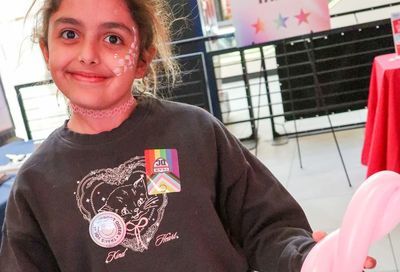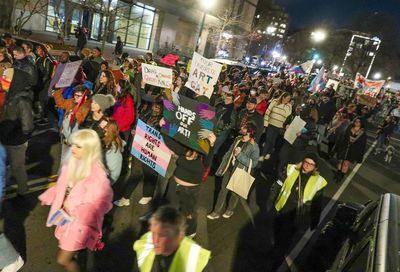State of the World
Commentary: Center Field
On March 11, the State Department released its Country Reports on Human Rights Practices for 2007. A compilation of the LGBT- and HIV/AIDS-related portions is available at glaa.org. An LGBT-only compilation, available at lgbtfpp.org, was released during a panel discussion in Washington on March 18 by the LGBT Foreign Policy Project, a coalition effort launched late in 2007 to encourage ”a clearer and stronger American voice” on international gay rights concerns.
The March 18 discussion featured openly gay former Ambassadors James Hormel and Michael Guest; Scott Long of Human Rights Watch; and Korab Zuka, founder of the first gay rights group in Kosovo, who recently won asylum in the United States. The discussion emphasized the need to press the State Department to act on its findings. An official from State was present and cited a 2007 directive from Secretary Rice for embassies to support human rights more actively, but this was contradicted by Rice’s recent waiver of human rights concerns to permit the release of military aid to Egypt.
Long noted a wide variation in the completeness of the individual country reports, reflecting the different priority given to this work from embassy to embassy. For example, the report for South Africa is silent on the rape, torture, and murder of a Johannesburg lesbian couple on July 8. On the other hand, I found 189 countries with relevant entries in the reports for 2007, up from 142 for 2006 and 105 for 2005.
Let’s review some highlights, both negative and positive.
In Egypt, the government used emergency courts intended for terrorism and national security cases to prosecute homosexuals and dissidents. The Iranian government closed a reformist daily newspaper for interviewing an alleged gay activist. In Iraq, several gay activists were arrested and tortured, and there were killings by Islamist death squads. In Saudi Arabia, numerous arrests were made at gay parties, weddings, and beauty contests. Dubai police interrogated several people on charges of cross-dressing, which was also criminalized in Kuwait.
Brazil’s Bahia Gay Rights Group reported 116 anti-LGBT killings, and ”confirmed that police continued to commit abuse and extortion directed against transvestite prostitutes.” Neo-Nazi and skinhead gangs in Chile committed anti-gay violence. Five Honduran police officers were charged with torture and illegal detention of several gay activists. Jamaican anti-gay abuses included police harassment, arbitrary detention, mob attacks, stabbings, and targeted shootings.
Gay marchers in Bucharest, Budapest, Moscow and Zagreb were violently attacked. In Kosovo, activists were detained and harassed by police. In Serbia, pro-gay activists were accused of being anti-Serb. Lithuanian gay groups were denied parade permits. Governments in Honduras, El Salvador, and the Philippines delayed, denied, or obstructed registration of LGBT groups.
In Romania there was widespread discrimination against children with HIV/AIDS. Moscow officials accused foreign non-profits that fight HIV/AIDS of ”encouraging pedophilia, prostitution, and drug use among teenagers.” A person released from a Havana prison for HIV/AIDS patients reported poor prison conditions, erratic medical care, and irregular provision of antiviral drugs. Across Africa, from Burundi to Zimbabwe, millions of AIDS orphans lived on the streets.
On the plus side, Gay pride events were held successfully in Lima, Taipei, Krakow, Warsaw, Riga (Latvia), Tallinn (Estonia), and Ljubljana (Slovenia). Sierra Leone passed a law prohibiting HIV/AIDS-based discrimination. Mozambique passed a law prohibiting anti-gay workplace discrimination. Dutch parliamentary hearings led to the reversal or delay of government plans to return gay refugees to Iran. The Polish minister of education sought unsuccessfully to bar the promotion of homosexuality in schools, and his party lost its seats in parliament. The Nepalese Supreme Court upheld the rights of sexual minorities. In Thailand, the military stopped labeling homosexuality as a mental disorder. In Taiwan, the Family Violence Prevention and Service Act was extended to same-sex couples.
In some of the harshest places one finds the bravest people. The honor roll of advocacy groups includes Sexual Minorities in Uganda; GenderDoc M in Moldova; Nash Mir in Ukraine; the Center for Social Emancipation in Kosovo; the Lesbian-Gay Rainbow Association of Comayaguela in Honduras; J-FLAG in Jamaica; and Lambda Istanbul in Turkey.
Even in Mali, where a law against immoral association was used to deny recognition to a gay rights group, it’s encouraging that there’s a gay rights group in the first place. So now it can be said that there is gay activism from here to Timbuktu.
MRichard J. Rosendall is a writer and activist whose work has appeared on Salon.com and the Independent Gay Forum (www.indegayforum.org). He can be reached at rrosendall@starpower.net.
Support Metro Weekly’s Journalism
These are challenging times for news organizations. And yet it’s crucial we stay active and provide vital resources and information to both our local readers and the world. So won’t you please take a moment and consider supporting Metro Weekly with a membership? For as little as $5 a month, you can help ensure Metro Weekly magazine and MetroWeekly.com remain free, viable resources as we provide the best, most diverse, culturally-resonant LGBTQ coverage in both the D.C. region and around the world. Memberships come with exclusive perks and discounts, your own personal digital delivery of each week’s magazine (and an archive), access to our Member's Lounge when it launches this fall, and exclusive members-only items like Metro Weekly Membership Mugs and Tote Bags! Check out all our membership levels here and please join us today!



















